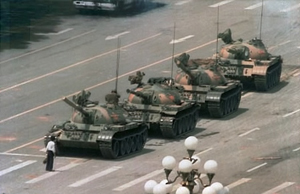“May you live in interesting times.” – Old Chinese Curse
A couple of weeks ago some friends were over and we began discussing China. While most of them were not Chinese, a few were and a couple more, myself included, had been to China for extended periods of time. This was about the same time the torch was in France and the protests in Tibet had occured.
We began a debate on whether or not democracy would ever come to China. My favorite comment came from Sam, from Beijing, who said, “F**k democracy and China”. Sam was arguing that democracy, while hailed by the West, has yet to pan out into the great form of government it is held up to be. All one has to do is look at the 2000 and 2004 elections in the US to see something is seriously wrong with it. And that as far as China as a political entity is concerned, it will outlast communism or democracy. Plus, that for the most part China has a form of democracy, an economic democracy.
I felt that China could develop a democratic political system. I argued that if the people decided they wanted it, no military effort on the part of the communist party would stop it from coming into being. There are simply too many eyes watching now. There really is no corner of the world left to hide and that with the Olympics and the Tibet situation China was really under the microscope. That it would be much harder for the communist party to sweep something like June 4,1989 under the rug.
Much has happened in China since then. Earthquakes have rocked the country, humanitarian efforts have mobilized and China is moving as one mind. Since the Tiananmen Square incident, (19 years ago) China hasn’t been this united. Anyone with Chinese friends and MSN messenger will notice the (heart) China. That was the initial response to the Anti0Chinese, Pro-Tibetan protests around the world. Since the earthquake Chinese people have rushed to donate blood and money to the relief efforts. When the IOC began the torch relay again the Chinese people spoke out and said, “no, we have a different priority now.”
But the earthquakes have subsided, and now in the aftermath what political aftershocks have yet to be felt?
In a New York Times article, Ma Jian discusses the grief the country is going through with the loss of so many people, particularily children. Parents are beginning to question why their sons and daughters were sent to schools that collapsed like houses of cards, while government buildings were still standing. That grief is beginning to turn to anger. Anger at the corruption, the favoritism. Will this anger become something more?

